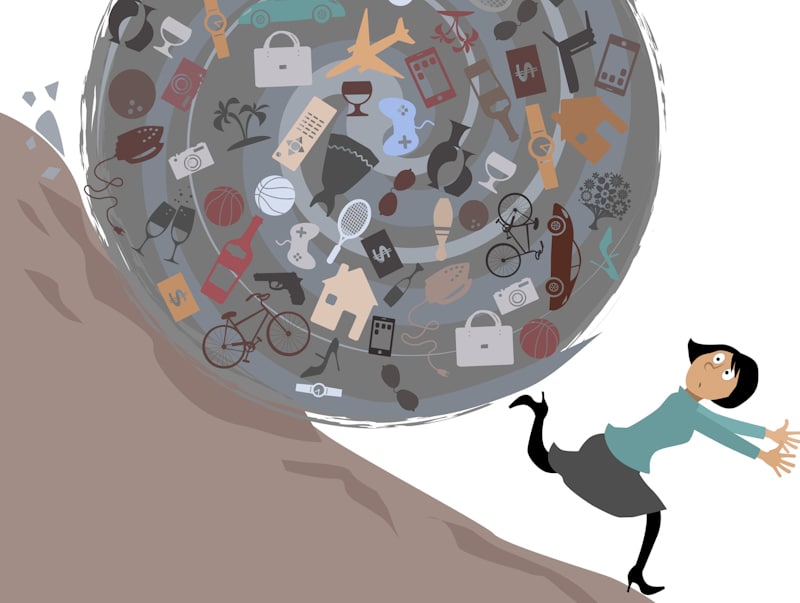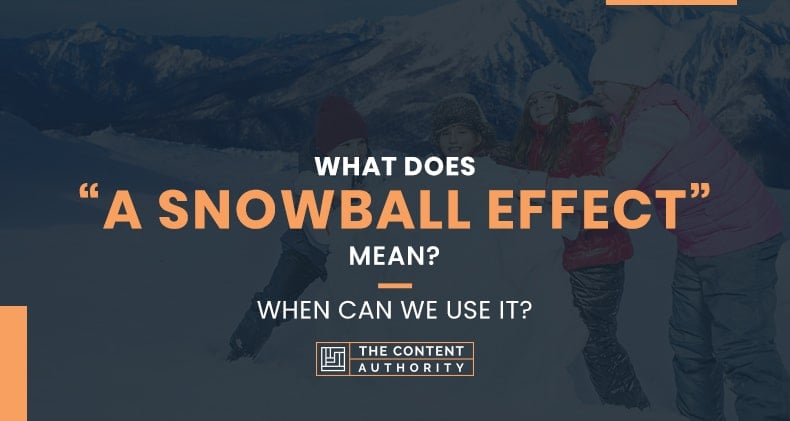Positivity is infectious; negativity can spread too. But the pace or intensity with which a thing (good or bad) unfolds is what matters. In other words, only good things should “snowball”, and the adverse events, such as the spread of a virus, should be stemmed right at the beginning.
“Snowball effect” means a ball of snow rolling down a snow-clad hill and increasing in size by attracting surface snow. Figuratively speaking, the phrase denotes “things gaining momentum with time”. More than for its literal meaning, the term is primarily used in texts symbolically.
The “snowball effect” phrase is used commonly in speech and texts, but not everyone understands the term in its entirety. Keep reading to learn all about the oft-used phrase, how it gets incorporated in sentences, etc.

“Snowball Effect” – Definition
As alluded to above, the term “snowball effect” is primarily a metaphor that denotes “a process that starts small and gains momentum over a period to become huge eventually”.
The less decorated or more straightforward way to mean “snowball effect” is using verbs such as “amplify”, “augment”, “compound”, “multiply”, “increase”, “proliferate”, etc. The thing that could get “snowballed” or go through the “snowball effect” include “fame”, “importance”, “fortune”, or “danger”.
In literal terms, “snowball effect” denotes “a snowball rolling down a hill covered with snow”. As the ball continues to roll, it picks up more snow, gaining increased surface area and mass as it moves along.
The process or thing that gets “snowballed” doesn’t gain size “physcially”, but it does so in “severity” or “seriousness”. And it’s generally to the detriment of the person or people concerned. In other words, the “snowball effect” mainly denotes a “vicious circle” and not a “virtuous circle”.
But then many good things get “snowballed” too, albeit not at the same pace.
Other Meanings or Applications of “Snowball Effect”
Besides its use in texts or literature, the “snowball effect” can also be depicted visually, usually through cartoons. Also, it’s quite a cliched term in psychology and modern theatrics. In aerospace engineering, the term elucidates on multiplication effects.
What is “Snowball”?
The phrase “snowball effect” has its roots in the word “snowball”, which also has its literal and figurative meanings. Getting to know the root word in detail is, therefore, essential.
The term “snowball” denotes “a spherical item made of snow”, typically created by manually scooping snow and compacting the ice crystals into a fist-sized ball. Snowballs are usually made for fun snowball fights, wherein players throw snowballs at each other and try to defend themselves from snowballs thrown at them.
The pressure exerted on the snow manually determines how the snowballs shape up. Reduced pressure results in a soft and light snowball. Compacting humid snow or applying increased pressure would result in an ice ball or a harder snowball. Snowball fights with such tightly packed balls can turn out dangerous.
A snowball could also be a big ball of snow created by rolling smaller snowballs on a snowy surface. The little snowball picks up more snow as it continues to move, becoming more prominent in the process. The terms “snowballing”, “snowball effect”, etc., are named after the same.
Snowmen are usually created by rolling out small snowballs to make them more expansive. Compared to compacting snow by hands, letting the snowball roll and increase in size is a bit more natural or less forced of a process. Snowballs made using this technique are ideal for making the snowman’s multiple sections.

Requirements to Make the Right Snowball
Snowballs are not as easy to make as they seem, or not all kinds of snow can be used to create a snowball. In other words, there are specific humidity/temperature ranges restricting or prohibiting a snowball’s formulation. Powdery snow, for instance, is not ideal.
In areas with temperatures under 0°C, the snow has little free water. Using such snow could result in crumbly snowballs. At temperatures above 0°C, however, the snow’s water content is adequate. Snowballs made using moist snow are more cohesive.
An even more straightforward, less scientific way to ascertain whether the snow is fit to make snowballs is to walk on them. If walking on the snow causes the ice crystals to squeak, the snow’s humidity/temperature level isn’t ideal. Squeaking snow is dry snow.
Other Meanings of “Snowball”
The term “snowball”, unlike “snowball effect”, could take up different avatars. For example, it can have sexual connotations or denote sexual activities. For example:
- She gave Tim a snowball.
A few other things the term “snowball” means include:
- Ice cream balls covered with coconut.
- Crushed ice ball covered with fruit syrup.
- Snow pressed together to make a ball and playfully throw at others.
- A cocktail made with advocaat (a kind of liquor) and lemon.
Using “Snowball Effect” in Texts
The phrase “snowball effect” is used in texts only as a noun, and it can be used to denote pretty much anything – right from politics to personal lives.
Take a political or social scenario, for example. People protest against the state’s policies and authoritarianism, but the state does not pay heed or even listen to the protestors.
The number of angry protesters, as a result, increase in strength and gain more solidarity from the general public who believe the inaction or callousness of the government is worth condemnation.
The series of events that take place after that is the “snowball effect” in action.
Using “Snowball” in Writings
Like “snowball effect”, the term “snowball” is also incorporated in texts as a noun. But it can also be used as a verb or as an adjective. Here are example sentences using the term as a verb:
- The high rates of unemployment rapidly snowballed into a huge budget issue for the ruling party.
- Guilt will eventually snowball into or as negative conversations or thoughts in your head.
- He pretty much ignored his credit card debt, paying just the minimum amount due on the card each month. That outstanding amount snowballed in no time, growing into a large debt mountain.
- Things began to snowball from that point.
The following sentences use “snowball” as an adjective:
- The team is now getting to see the snowball effect of speaking out.
- Using snowball sampling to monitor underground networks is a good idea.
“Snowball” is a noun too (as mentioned above), and the sentences below substantiate that:
- He lobbed at her a snowball, but because he did that in haste, the ball missed its target by a considerable margin.
- Once we get this rolling, it would be akin to rolling snowballs down a hill. The effect will be that huge.
- She had no option but to take cover after a flurry of snowballs were directed at her from all sides.
Example Sentences with the Term “Snowball Effect”
The following are sentences incorporating the phrase “snowball effect”:
- Did she even think about how her words will have a snowball effect?
- These women’s successes have had a snowball effect, with more women from the community entering the field in the past few years.
- All these barriers will bring about a snowball effect.
- The more successful and famous you become, the more money you make. It’s pretty much a snowball effect.
- The town hopes the improvements made will bring about a snowball effect, spurring private and foreign investment in the region.
- Setting mini-goals leads to a feeling of having accomplished something. And when you feel good, you tend to make more positive decisions. It is a snowball effect.
- The flick was panned by the critics and audience alike. That created a snowball effect, resulting in the movie getting removed from the theaters just three days after its release.
Other Great Idioms
Difference Between “Snowball Effect” and “Domino Effect”
A domino effect is a chain reaction or cumulative effect created when a particular event or incident sets off a series of similar events. The effect is “mechanical” and used in texts as an analogy.
For a domino effect to occur, a sequence of events is pre-linked or already set in place. With a snowball effect, there’s no clear path or pre-sets in place. Pretty much no one knows or can predict snowballing’s outcome or impact – both literally and figuratively.
In other words, when a small snowball rolls down a hill, it’s not easy to ascertain the shape it will assume or how big it’ll become eventually. Some snowballs can take up large forms, and some could disintegrate in the process. Figuratively speaking, an incident or situation could snowball into something big, or it may lose steam at the beginning itself.
For instance, a negative remark made by a politician at a press conference could get snowballed or blown out, or it may fall on deaf ears.
Similarly, a good movie without strong marketing could turn into a blockbuster purely through word of mouth, or it may not achieve its goal or make the kind of money it could have potentially made in the wake of all the positive talks.

These aspects set the “snowball effect” apart or differentiate it from the “domino effect”, which is a lot more organized or systematic, or relatively easy to presume.
Another significant difference is that the events resulting from the snowball effect increase in intensity or grow exponentially. That, however, isn’t the case with a domino effect. It’s pretty equal and uniform.
In short, the spread of a virus is a “snowball effect”. On the other hand, the negativity attached to a bad day at the office getting carried over to home is a “domino effect”.
Conclusion
Few terms in English have a pretty straightforward meaning and can yet mean so many other things – both literally and metaphorically – as “snowball” does. “Snowball effect” is just an example of how the word could be used to mean something else. Not to mention, the term “snowball effect” assumes varied meanings of its own.
Shawn Manaher is the founder and CEO of The Content Authority. He’s one part content manager, one part writing ninja organizer, and two parts leader of top content creators. You don’t even want to know what he calls pancakes.

